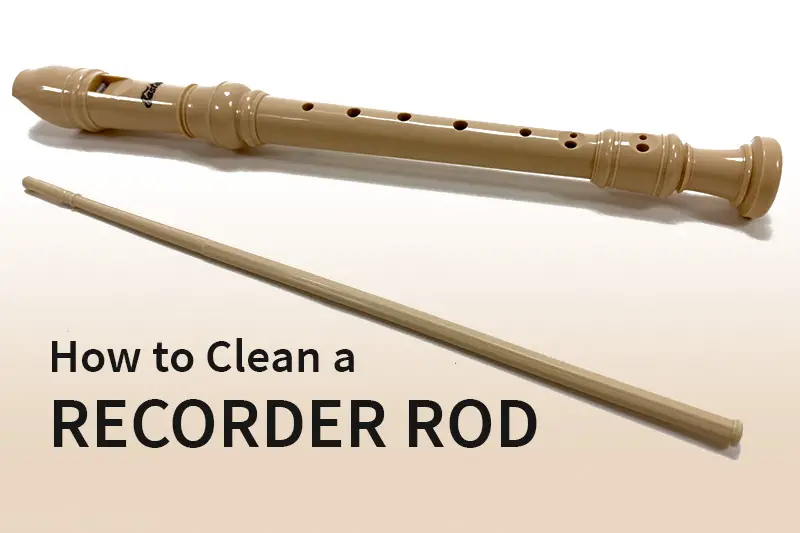Keeping our instruments clean is an important job. In recorders, dirt and saliva can easily build up causing it to be a bit of a safety hazard and even changing the sound. That is why you must have a recorder cleaning rod to ensure that the instrument is up to par while keeping the rod itself squeaky clean, too.
Recorder rods need to be cleaned to avoid spreading germs back into the cleaned recorder. To clean a recorder rod, follow these steps:
- Wash your hands.
- Prepare warm soapy water.
- Let the rod soak or just scrub it thoroughly.
- Dry it off with a cotton cloth.
There are only a few steps to take while cleaning your recorder rod, but each is critical. Keep reading the article to discover how to clean it more in depth, why it actually needs cleaning, and even how to make one yourself at home!
How to Clean a Recorder Rod
You should always make sure that your cleaning tools themselves are as clean as possible before using them to clean something else. Luckily, it’s easy to clean your recorder rod off.
Here is how to clean your recorder rod:

Wash your hands. Perhaps the most important step in the process is making sure your hands are clean before you touch anything. It there is dirt and filth all over your hands, then you will just be spreading it to the cleaning rod. Wash your hands with an antibacterial soap, scrubbing each part of it for at least 20 seconds.
- Prepare warm, soapy water. For this step, you will need a container that is long enough to fit your cleaning rod. You will need 1 part dish soap with about 4 parts of warm water. If you do not have any dish detergent on hand, then antibacterial soap will do just as well.
- Let the rod soak or scrub it thoroughly. Place our recorder rod into the warm, sudsy bath, and let it soak for at least 15 minutes if you have a plastic recorder cleaning rod. After the 15 minutes is up, wet a cloth in the soapy water and just give your rod a good scrubbing to make sure there is no dirt leftover.
- Dry it off with a cotton cloth. If you have a plastic recorder cleaning rod, then after it has been soaked and scrubbed, you can simply just lay it out on a towel to dry. If it is wooden, then be sure to wipe all of the water off it with a lint free cloth and then place it on a towel to become completely dry.
If your recorder cleaning rod is wooden, then you would not want to soak it. Instead, bring a clean cloth with you and dip your cloth into the water. From there, you can scrub your recorder rod, thoroughly, ensuring that you don’t miss any spots.
Just follow these steps and you will not have to worry about a dirty, germy recorder cleaning rod going into your recorder.
Do You Even Need to Clean a Recorder Rod?
At a first glance, it may seem a bit strange to put so much thought into cleaning a cleaning rod. Be that as it may, it is still extremely important and something that needs to be tended to.
Not sanitizing your recorder rod can lead to the spread of dirt and bacteria throughout your recorder. Not only can bacteria make you ill, but it can also cause dirt to get clogged up in the windpipes of your recorder and change or completely block out the sound.
So, yes, it is a definite must that you keep that recorder rod clean.
What is a Recorder Rod Used For?

You are probably already using a cleaning rod but let’s cover this anyways. A recorder rod is used for cleaning recorder instruments, such as flutes. Recorder instruments are thing, long rods made from wood or plastic that you use to wipe the inside of your recorder with.
Since recorders are quite narrow and thin, and obviously need to be cleaned from time to time, the recorder rod is the perfect tool for the job. They can be wooden or plastic, as well, and look like a large needle with a thread hole at the top of it.
The thread hole is so that you can place a piece of the cleaning cloth through it to wipe away the inside of the recorder.
The recorder cleaning rod gets in those hard to reach places that would be tough otherwise to get to.
Plastic Recorder Rods VS Wooden Flute Rods
Usually when you buy a recorder, it comes with a cleaning rod. But, if you are having trouble deciding if you should have a plastic recorder rod or a wooden flute rod, then we are here to help. We’ll discuss in more detail below.
Plastic Recorder Rods
Typically, a plastic recorder rod will come with your recorder as a set when it is purchased. Depending on how you bought yours, that may not be the case for you.
Plastic recorder rods are extremely easy rods to deal with. Since they are only plastic, they are exceptionally durable and do not require much attention at all while cleaning them. Just because they are easy though, it does not mean it is the one you should buy. If you have a wooden recorder, then the plastic recorder rod could possibly scratch up the inside of your instrument.
 Wooden Flute Rods
Wooden Flute Rods
Wooden flute rods are made specifically for flutes, not recorders. While they look and function the same, a flute rod has a wider diameter and will not fit into a recorder. So if you’re looking to clean the interior of your recorder, a flute rod will not be a good fit.
How to Make Your Own Recorder Cleaning Rod
Saving money is always a great thing. If there is ever a time you can make something from items that are in your house, then go for it and save yourself a few bucks.
This is what you can do to make your very own recorder cleaning rod:
- Find a thin plastic coat hanger and cut each end of the bottom of it so that you have one long, straight rod.
- Use a lighter to carefully, and only slightly, melt each end of the rod.
- While the ends are still warm, roll them gently on a cutting board to smooth out the harsh edges that you cut.
- Let it cool completely. It will not take long.
- Place a thin piece of lint-free fabric over one end, almost like you are making a tent.
- Then pull it tightly down to the other end so that the fabric is covering the plastic rod.
After these steps have been completed, you have made your very own recorder cleaning rod and you didn’t have to spend a dime!
Recorder Rods Are Easily Cleaned
While it seems like a simple thing, maintaining a clean rod to clean your recorder can give you peace of mind. The last thing anyone wants to think about when practicing their scales is whether or not they’re breathing in a bunch of dust and bacteria. Using a recorder rod, either wooden or plastic, means you know that the inside of your instrument is sparkling clean.


